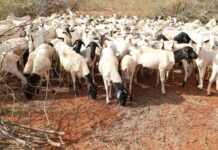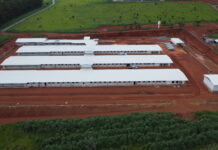
The Australian Centre for International Agricultural Research (ACIAR) has initiated a $2.4 million project aimed at enhancing the livelihoods of smallholder goat and sheep farmers in Ethiopia. This four-year initiative seeks to fortify trade networks and implement sustainable production and marketing strategies to improve the economic well-being of rural communities.
The project, which will also be implemented in Pakistan, is led by the International Center for Agricultural Research in the Dry Areas (ICARDA). It builds upon a decade of ACIAR-funded research in Asia and the Pacific, aiming to transfer successful smallholder sheep and goat production practices from Ethiopia to Pakistan. Central to the initiative is the adoption of Community-Based Breeding Programs (CBBPs), developed by ICARDA, to improve genetic traits and overall productivity in small ruminant farming.
In Ethiopia, goats and sheep are integral to smallholder farming systems, especially for women and landless individuals, contributing significantly to household nutrition and income. Despite their importance, challenges such as high mortality rates in kids and lambs, unregulated breeding, inadequate disease surveillance, and fragmented market linkages have hindered the sector’s potential. The new project aims to address these issues by enhancing breeding practices, improving animal health services, and strengthening market connections.
A key component of the initiative is the implementation of CBBPs, which involve local communities in the selection and breeding of animals, ensuring that genetic improvements align with farmers’ needs and preferences. These programs have shown success in Ethiopia, leading to measurable genetic gains and socioeconomic benefits. By expanding CBBPs, the project seeks to increase productivity, improve animal health, and promote gender equality within the livestock sector.
Additionally, the project will focus on enhancing market access for smallholder farmers through the establishment of breeder cooperatives and the utilization of digital platforms. These efforts aim to create more efficient and equitable marketing systems, enabling farmers to receive better prices for their livestock and products. The initiative also emphasizes capacity-building, particularly for women and youth, to ensure inclusive participation and benefit-sharing across the value chain.
Dr. Anna Okello, ACIAR’s Research Program Manager for Livestock Systems, highlighted the project’s potential to transform small ruminant farming: “By investing in proven community-based breeding approaches and strengthening market linkages, we aim to unlock the untapped potential of small ruminant farming. This project aligns with our strategic objectives to enhance productivity, support sustainable livelihoods, and foster inclusive economic growth in our partner countries.”
The initiative represents a significant step towards formalizing sheep and goat value chains in Ethiopia and Pakistan, with the goal of creating resilient and profitable farming systems. By addressing systemic challenges and promoting inclusive practices, the project aspires to improve the livelihoods of smallholder farmers and contribute to the broader development of the agricultural sector in both countries.







